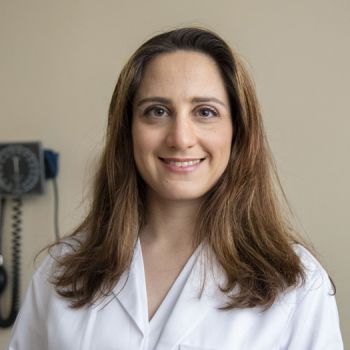Dry eyes are a common condition, especially when people spend too much time in front of screens. Luckily, there are treatments available and approaches you can take at home to prevent dry eye from developing (get a humidifier!). Here, Maya Bitar, MD, associate professor of ophthalmology at the George Washington University (GW) Medical Faculty Associates (MFA), walks us through what causes dry eye and what you can do to mitigate symptoms.

What is dry eye?
Bitar: Dry eye is actually a more complex disease than a lot of people think. Dry eye is defined as a disease of the ocular surface, the whole surface of the eye, due to a loss of homeostasis, meaning that there is a break in the balance [of elements] on the surface of the eye. It’s often related to some kind of inflammation on the surface of the eye or a problem with the nerves that are on the front of the eyes.
What are symptoms of dry eye?
Bitar: There are a variety of symptoms that can indicate dry eyes. We ask patients about eyes feeling dry or burning, grittiness, foreign body sensation, even tearing. It sounds like it would be the opposite, but dry eyes can cause tearing. They can also cause fluctuating vision. Often, patients come in complaining, “[My vision] gets blurry from time to time,” or “I feel like I have to blink a lot so I can see better.”
How common is dry eye?
Bitar: Dry eye is very common, especially in women and the elderly. With lots of people working from home and spending so many hours on the computer, we have been hearing more complaints of dry eyes.
When we focus on something, our eyes forget to blink. Tears naturally evaporate on their own, and our eyes blink to replenish the tear film. If you forget to blink and your tears have evaporated, then your eyes are very vulnerable and they get dry.
There is a rule for when you’re on the computer called 20-20-20. Every 20 minutes, focus 20 feet away for 20 seconds, and then go back to work.
How do you diagnose dry eye?
Bitar: First, we get a good history from the patient to understand when the symptoms mainly occur and what environment the patient is in. Then, we can do a very thorough examination of the surface of the eye, including the eyelids. The eyelids are an important part of the ocular surface because there are glands in the eyelid that are responsible of making the oily part of the tears. We examine the eyes with a slit lamp, which is a kind of microscope, and that gives us most of the clues for the diagnosis and what is causing it. In addition to that, there are some tests that we can do in the clinic. We can test the tears and learn, for example, if you’re making enough tears or if there is inflammation in your eyes.
There is a test [called InflammaDry] that we started using here. It takes samples of your tears. It also detects the amount of a certain inflammatory molecule called MMP9, which is an indicator of dry eyes.
How does InflammaDry work?
Bitar: It looks like a pregnancy test: we take a sample of tears with an applicator, let it sit, and if a line appears, it means that it is positive [or there is this molecule present]. The applicator is like a little wipe that we dab inside the lower eyelid to get tears. It can be a bit uncomfortable, but it’s really quick.
What are effective treatments for dry eye?
Bitar: There are a lot of treatments for dry eyes, and it’s really an exciting time for dry eye sufferers because there are so many new treatments that have come out in the last few years, with even more in the pipeline. Still, there is no magic cure for dry eyes, but with different treatments combined, you can get significant improvement.
We usually start with a baseline regimen, such as applying warm compresses to the eyes. As I mentioned before, there are oil glands in our eyelids that are very important, and often those glands are not working well in dry eyes. The oil in them becomes harder, more like butter, or they’re clogged. The heat is very useful because it helps melt that butter back to oil and opens up the pores, allowing this oil to come out and moisturize the eyes. This is something we usually recommend long-term for continuous benefit.
Another thing that can be helpful is taking fish oil or omega-3 and using artificial tears you can buy over the counter. Those help to supplement your own tears and lubricate your eye. There are many different kinds, and depending on our exam, we would recommend which one could work the best for you. There are also different prescription medications or advanced treatments that we can offer depending on the case.
What can people do to prevent dry eye?
Bitar: There are some environmental changes they can make to help. In the winter, for example, the air gets very dry because of the [indoor] heat, so it’s a good idea to have a humidifier. Some people also have a fan in their bedroom on the ceiling or the heat/AC vent blowing next to their bed, and that can cause dry eyes as not everybody closes their eyes all the way when they sleep. Similarly, in the summer, if you’re driving and your AC is blowing on your eyes, it’s also going to dry your eyes out. Staying away from dust, air pollution, and smoking is important, as is taking breaks during computer usage, as I mentioned previously. Some medications, including over-the-counter products, can cause dry eyes.
Are dry eyes ever a sign of a more serious condition?
Bitar: Yes. Dry eyes can be associated with many serious conditions. These are mainly autoimmune diseases, such as lupus or rheumatoid arthritis, that cause inflammation in the body including the eyes. Inflammation is one of the causes of dry eye, and these diseases can damage the glands that make the tears, and then you get dry eyes.
If you have severe dry eyes and dry mouth, it could be a sign of Sjorgen’s syndrome, for example. It is an autoimmune disease that is important to diagnose because it can be associated with other problems in the vital organs, such as heart problems, and in some cases, it has been associated with lymphoma or other cancers. If a patient comes in and they have certain signs of dry eyes and they also have dry mouth, we can test them for that syndrome.
To make an appointment with an ophthalmologist, visit the GW MFA Department of Ophthalmology or call 202-741-2800.




